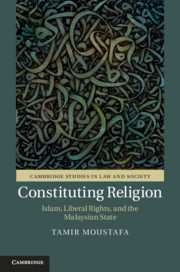Constituting Religion
Most Muslim-majority countries have legal systems that enshrine both Islam and liberal rights. While not necessarily at odds, these dual commitments nonetheless provide legal and symbolic resources for activists to advance contending visions for their states and societies. Using the case study of Malaysia, Constituting Religion examines how these legal arrangements enable litigation and feed the construction of a “rights-versus-rites binary” in law, politics, and the popular imagination. By drawing on extensive primary source material and tracing controversial cases from the court of law to the court of public opinion, this study theorizes the “judicialization of religion” and examines the radiating effects of courts on popular legal and religious consciousness. The book documents how legal institutions catalyze ideological struggles that stand to redefine the nation and its politics. Probing the links between legal pluralism, social movements, secularism, and political Islamism, Constituting Religion sheds new light on the confluence of law, religion, politics, and society.
This title is also available as Open Access on Cambridge Core at 10.1017/9781108539296.
Tamir Moustafa is Professor of International Studies and Stephen Jarislowsky Chair at Simon Fraser University in Vancouver, Canada. His research stands at the intersection of law, religion, and politics. Among other works, he is the author of The Struggle for Constitutional Power: Law, Politics, and Economic Development in Egypt (Cambridge University Press, 2007) and the co-editor of Rule by Law: The Politics of Law and Courts in Authoritarian Regimes, with Tom Ginsburg (Cambridge University Press, 2008).

